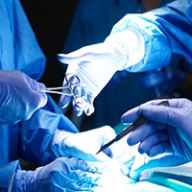What It Takes To Be a General Surgeon
Medically reviewed by
Dr. Danielle Saldana
McLeod Surgery Clarendon
The term “General” Surgeon doesn’t quite capture the breadth or complexity of this medical specialty. More accurately, as one General Surgeon says, “We are specialists – with a wide range of expertise.”
“I like the variety of surgical challenges I face,” says McLeod General Surgeon Danielle Saldana. “One day, it might be a hernia repair. Next day, I might be working on something involving the head and neck. Plus, I’m always learning new, less invasive techniques, which helps people recover more quickly with less pain and smaller scars.”
It takes a talented person to become General Surgeon. Not only do they have to like the time in the Operating Suite and grasp the subtleties of a wide range of surgeries, but other traits a good General Surgeon should exhibit are:
- Manual dexterity, obviously, to tie those knots (one-handed, if possible).
- Thinking on their feet while solving unexpected developments during surgery.
- Calm temperament under pressure.
- Physical stamina to stand in the OR for hours on end.
- Ability to inspire confidence in their patients and surgical team members.
- Lead and manage a team effectively.
- Treating the whole patient and not just an individual problem.
- Continuing education to allow the newest evidence based medicine, including minimally invasive techniques
Among the many conditions that a General Surgeon may deal with are issues of the head and neck, esophagus, gall bladder, appendix, breast, colon, skin, abdominal wall and soft tissues. They may also perform an endoscopy, the insertion of a long, thin tube directly into the body to observe an internal organ or tissue in detail. It can also be used to carry out minor surgery.
ACTION YOU CAN TAKE
If you have a problem or your personal physician has identified a problem that requires surgery, ask for a referral to a General Surgeon. Patients can contact a General Surgeon directly (also called self-referral), but should understand that most insurance plans require a referral before scheduling an appointment with a surgeon.
Find a General Surgeon near you.
Sources include: McLeod Health, Healthgrades, Health Careers, JAMA Network, Royal College of Surgeons, American College of Surgeons
-
McLEOD REGIONAL MEDICAL CENTER FLORENCE
843-777-2000 -
McLEOD DARLINGTON
843-777-1100 -
McLEOD DILLON
843-774-4111 -
McLEOD LORIS
843-716-7000 -
McLEOD SEACOAST
843-390-8100 -
McLEOD CHERAW
843-537-7881 -
McLEOD CLARENDON
803-433-3000



-
McLEOD REGIONAL MEDICAL CENTER FLORENCE
843-777-2000 -
McLEOD DARLINGTON
843-777-1100 -
McLEOD DILLON
843-774-4111 -
McLEOD LORIS
843-716-7000 -
McLEOD SEACOAST
843-390-8100 -
McLEOD CHERAW
843-537-7881 -
McLEOD CLARENDON
803-433-3000
 Find a Doctor
Find a Doctor  Locations
Locations  Services
Services 